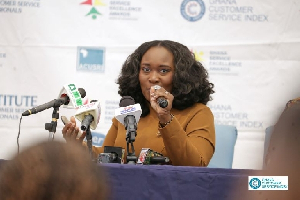I travelled to Ghana two years ago. Before I left, a friend gave me a mobile phone to be given to his brother, Imoru Hassan, who lived at Old Fadama. I arrived at the Kotoka International Airport close to two o'clock in the afternoon. We stepped out of the plane to a hot November afternoon. After going through immigration and custom processes, I decided to send the mobile phone to Imoru Hassan before I left for Kumasi. I put all my luggage in a taxi and told the driver to take me to Old Fadama. The driver turned to me and said, "Sir, the area is now called Sodom and Gomorrah”.
Why Sodom and Gomorrah? I asked myself. My mind went back to the story of Sodom and Gomorrah in the Old Testament. The Biblical account of the two cities is recorded in Genesis chapters 18 and 19. Chapter 18 begins with the Lord and two angels coming to speak with Abraham. He was informed by the Lord that the outcry against Sodom and Gomorrah was so great, and their sins very grievous. Abraham pleaded with the Lord to have mercy on Sodom and Gomorrah because his nephew Lot, and his family lived in Sodom. The angel of the Lord told Lot and his family to flee the cities to escape the wrath the Lord was about to bring to the two cities. They fled immediately and the Lord rained down burning sulphur on Sodom and Gomorrah. The cities, the people and all that were in them were destroyed.
We drove through Sodom and Gomorrah, not the one in the Bible, but the one situated in Accra. We asked only two people and we were able to find Imoru Hassan. We entered his room. It was about 25 metres squared. Imoru lived in that small room with his wife, two daughters and one son. Imoru easily guessed that we were there to give him a mobile phone from his brother. I asked him to show me where I could urinate. He turned immediately to his wife. I could see he was under pressure. He told me there was no decent place to urinate but I could go behind the house and release myself there. I observed something when I went out to urinate. I asked Imoru the type of people who lived in Sodom and Gomorrah. "We have prostitutes, lesbians, homosexuals, drunkards, drug addicts and armed robbers." Imoru said. I told him I saw some people offloading different kinds of goods from a lorry to a room. I asked him who the shop owner was. Imoru smiled and revealed that they are a group of armed robbers. The house belongs to the leader of the group. They offload stolen goods twice a week. I wanted to know if the police was aware. "They have bought all the policemen in Accra," he said quietly.
About a month ago, I did not believe what I heard about Sodom and Gomorrah. I wondered what happened to Imoru Hassan, his one room house and his family. What about the ware-house of the armed robbers? Were their booty also crashed by the bulldozers?
The fact of the unfortunate incident began to unfold: Ghana's biggest slum, Old Fadama, popularly referred to as Sodom and Gomorrah, was pulled down by the Accra Metropolitan Assembly (AMA) and The National Disaster Management Organization (NADMO). The slum housed over 60,000 residents, mostly people from the northern part of Ghana.
The demolition of the slum happened as a result of flooding on June 3, 2015, that took over 150 lives. The flood was Ghana's biggest disaster to have happened since over 120 people died during a local soccer stampede on 9th May 2001.
Alfred Okoe Vanderpuije, the Accra Metropolitan chief executive, has warned of more demolitions in the area. Many Ghanaians have accused the government of failing to make good on its promise to help residents whose businesses and houses were destroyed. Angry residents living in Sodom and Gomorrah, including youth, men, women and children protested against the demolition and vowed not to vote for the incumbent president in the upcoming elections.
The problem of flooding in Accra cannot be blamed on Sodom and Gomorrah alone. There are many slums and near-slums that have blocked the waterways. A more serious approach is needed towards achieving a lasting solution to the flood problem. Ghanaians are tired of the professional laziness of our engineers and city planners. Why should our officers in authority only begin to act when flooding has already destroyed properties? Is the demolishing of Sodom and Gomorrah a permanent answer to flooding in Accra or more townships will have to be pulled down? If former president Kufuor had towed the same line of action, many places would have been destroyed. Alajo was an area which was heavily affected by flood. This present government would probably have demolished Alajo but Kufuor, in his wisdom, caused the construction of very wide gutters beside Alajo as a means of diverting flood waters that could have affected Alajo.
Thousands of people were affected by the demolition of Sodom and Gomorrah. All their properties were destroyed. To add insult to injury, these migrants were ordered by the government to leave Accra and head on to the northern regions where they belong. This is a repugnant display of ignorance and tribalism by state officials who should know better. The constitution of Ghana gives the right to every Ghanaian to live wherever he or she wants. What the government should have done was to provide alternative accommodation to those whose houses were demolished. Sadly enough, these people who have been rendered homeless have become strangers in their own country.
When I compare the plight of the homeless people of Sodom and Gomorrah to the warm reception given to the refugees from Liberia and Cote d'Ivoire, it clearly reveals the greed and wickedness of the government. Due to the money that is paid by the United Nations to the government of Ghana, the refugees are given accommodation and food while the homeless Ghanaians are treated with disdain. This is discrimination pure and simple. Lord, have mercy!
The demolition of Sodom and Gomorrah, suffering and homelessness of residents and the negative, discriminatory and the tribal attitude of those in authority, sparked off an intensive demonstration. About 1500 residents of Sodom and Gomorrah took part in the demonstration. They went on rampage, blocking the entrance to the Banquet Hall of the State House and all roads leading to the parliament house, AMA office and Agbogbloshie market. Some of the demonstrators carried placards eulogizing the 2016 NPP flag bearer, Nana Akufo Addo. They shouted enthusiastically, "No Akufo Addo no vote." The demonstrators angrily drummed home to President Mahama concerning the wrongful and unannounced destruction of their houses and properties and their businesses which have rendered them homeless and jobless. The police had a difficult time containing the demonstrators. Despite the heavy security presence, the demonstrators succeeded in making their presence felt and they were able to state their worries clearly.
Dear reader, will the demolition of Sodom and Gomorrah abate or stop flooding in Accra? Don't you think the people were right to cry foul when no arrangements were made to accommodate the thousands of people who were rendered homeless? Are the Northerners who lived in the area not right in complaining about discrimination and tribalism against the Northerners when they were told to leave Accra and go back to the northern region where they belong? Are some people more Ghanaian than others? This is up to us and posterity to answer this.
Written by Stephen Atta Owusu
Author: Dark Faces at Crossroads
Email:stephen.owusu@email.com
Opinions of Monday, 13 July 2015
Columnist: Owusu, Stephen Atta















